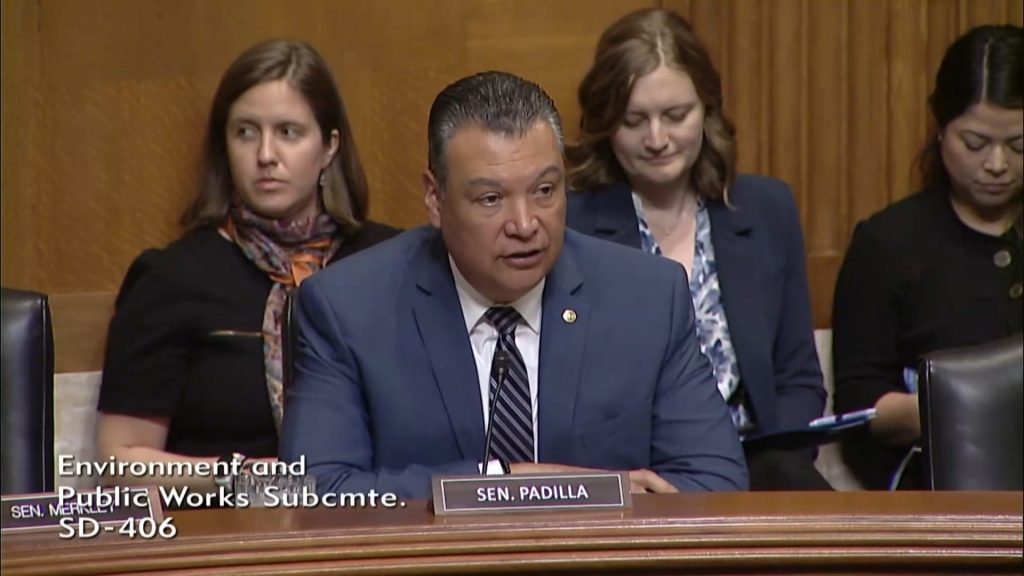Padilla Leads Joint Hearing on Microplastics in Water

WASHINGTON, D.C. — Today, U.S. Senator Alex Padilla (D-Calif.), Chair of the Senate Environment and Public Works (EPW) Subcommittee on Fisheries, Water, and Wildlife, convened a joint hearing with Senator Jeff Merkley (D-Ore.), Chair of the EPW Subcommittee on Chemical Safety, Waste Management, Environmental Justice, and Regulatory Oversight, to explore the impacts of nanoplastics and microplastics in drinking water and wastewater. During the hearing, Padilla highlighted California’s first-in-the-nation microplastics monitoring program for drinking water and raised the alarm about recent findings regarding the potential harms of microplastics on human and environmental health.
The hearing, entitled “Understanding the Presence of Microplastics in Water,” was the fourth subcommittee hearing Padilla has convened this Congress. Padilla questioned Dr. Susanne M. Brander, Associate Professor, Oregon State University, College of Agricultural Sciences, Department of Fisheries, Wildlife, and Conservation Sciences; Dr. Sherri A. “Sam” Mason, Ph.D., Director of Sustainability, Penn State Behrend; and Mr. Brent Alspach, P.E., Vice President & Director of Applied Research, Arcadis.
In his opening remarks, Padilla discussed the concerning ubiquity of microplastics and nanoplastics. These tiny, often microscopic plastics have been found throughout our environment, including in the air, ocean seabeds, aquatic species, and even human lungs and bloodstreams.
“While the study of microplastics is, in fact, still emerging, one thing we do know, beyond a shadow of a doubt, is where we can find microplastics. Because the answer is everywhere. It’s all around us,” said Senator Padilla. “While we continue to learn more and more about the presence of microplastics on the planet, the question must also become: what are the potential impacts of microplastics on human health.”
Padilla highlighted California’s leadership as the first government in the world to require testing and monitoring of microplastics in drinking water. This roadmap will help develop a definition of microplastics and standardize methodologies for measuring plastic levels in drinking water that could inform future research, monitoring, and treatment efforts.
Padilla heard further from Dr. Brander about the California Ocean Protection Council’s efforts to incorporate both scientist and stakeholder feedback and work with California state agencies to establish the pioneering monitoring program. Dr. Brander echoed Padilla’s sentiment that the program serves as a strong example for other states. Mr. Alspach added that the California State Water Board has approved two innovative technologies to improve comprehensive microplastic monitoring — infrared spectroscopy and Raman spectroscopy — which can detect plastics as small as 50 microns and 20 microns, respectively.
Senator Padilla has long been a staunch advocate for ensuring access to safe water throughout California and across the country. Last week, he and Representative Salud Carbajal (D-Calif.-24) led 22 California lawmakers in calling on the Office of Management and Budget to include robust, long-term funding for research on the harmful impacts of the dumping of dichlorodiphenyltrichloroethane (DDT) and its associated chemicals in the ocean waters off the coast of Southern California. Padilla and Senator Laphonza Butler (D-Calif.) also announced that the U.S. Environmental Protection Agency (EPA) awarded over $510 million to California for drinking water and clean water infrastructure. Last year, Padilla convened an EPW subcommittee hearing examining drinking water and wastewater infrastructure challenges in Tribal communities.
###